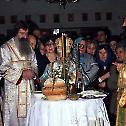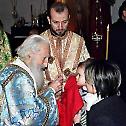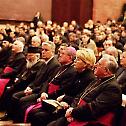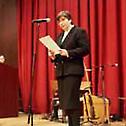Culture
Medieval Monuments in Kosovo and Metochia
19. February 2008 - 15:00
UNESCO's Committee for World Heritage, at a July conference held in Vilnius, Lithuania, decided to include the Church of Our Lady of Ljeviš, the Gračanica monastery and the Patriarchate of Peć on the list of world heritage sites, by which their universal value as cultural monuments was recognised. Serbia had prepared their official nomination and created the nomination file prior to the session of the Committee that subsequently decided to include the monuments on the List. One session was enough to approve the inclusion of three monuments on the List because they were nominated as a group. The Monastery of Dečani, incidentally, has been on the List since 2004.
A Russian missionary called the Gospels of Judas TV film antiscientific and anti-Christian
7. February 2008 - 10:42
 Moscow, February 4, Interfax – Documentary the Gospels of Judas broadcast on Russian television is antiscientific and was produced by people who hate Christianity, professor of the Moscow Theological Academy deacon Andrey Kurayev believes. ‘The film is both antiscientific and anti-Christian. It is antiscientific primarily because the spectator does not get from it the essence of the Gnostic myth,’ Fr. Andrey said in his interview to Interfax-Religion.
Moscow, February 4, Interfax – Documentary the Gospels of Judas broadcast on Russian television is antiscientific and was produced by people who hate Christianity, professor of the Moscow Theological Academy deacon Andrey Kurayev believes. ‘The film is both antiscientific and anti-Christian. It is antiscientific primarily because the spectator does not get from it the essence of the Gnostic myth,’ Fr. Andrey said in his interview to Interfax-Religion.
Restoration Uncovers More Frescoes in Pec Patriarchate
14. December 2006 - 8:00
 The Patriarchate of Peć, a complex of medieval sacral edifices near the Kosovo town of Peć, next to the Bistrica River at the mouth of the Rugovska Klisura canyon, is one of the most significant monuments of Serbian history.
The Patriarchate of Peć, a complex of medieval sacral edifices near the Kosovo town of Peć, next to the Bistrica River at the mouth of the Rugovska Klisura canyon, is one of the most significant monuments of Serbian history.
The monasterial complex includes four churches and a series of other edifices built in the 13th and 14th centuries. The founders of some of the churches were the notable Archbishops Arsenije I, Nikodim I and Danilo II.
Years with Andrić and Years without Him
26. June 2006 - 7:00Ivo Andrić, the most well known writer of the former Yugoslavia, passed away thirty one years ago, and sixty one years ago published his novel "The Bridge on the River Drina", for which he won the Nobel Prize for Literature.
 If
we add two re-printed and recently published titles - a book of
interviews and Ivo Andrić's doctoral dissertation edited by Prof.
Radovan Vučković, a prominent authority on his life and work, we have
reason enough to remember this writer, especially following the bloody
war in the dark Bosnian town in which his most famous novel was set.
After the abyss and civil war that tore the region asunder, it is
instructive and restorative to read Andrić, a writer who used prose to
build bridges between cultures separated by conflicts, convictions and
religions.
If
we add two re-printed and recently published titles - a book of
interviews and Ivo Andrić's doctoral dissertation edited by Prof.
Radovan Vučković, a prominent authority on his life and work, we have
reason enough to remember this writer, especially following the bloody
war in the dark Bosnian town in which his most famous novel was set.
After the abyss and civil war that tore the region asunder, it is
instructive and restorative to read Andrić, a writer who used prose to
build bridges between cultures separated by conflicts, convictions and
religions.
Saint Sava Academy at the Theological Faculty of the Serbian Orthodox Church
28. January 2004 - 13:28His Holiness Serbian Patriarch Pavle celebrated the Divine Liturgy in the Chapel of the Theological Faculty on the Feast of St. Sava, the First Serbian Archbishop and Enlightener of the Serbs. Following the Liturgy the Patriarch performed the rite of cutting the festal bread in honor of the Patron Saint and delivered a homily on the significance of St. Sava for the development of Serbian spirituality. According to the Patriarch, St. Sava is the indicator of the way to the Lord and Heavenly Kingdom, and our intercessor before God.





